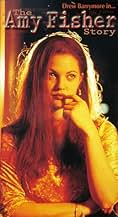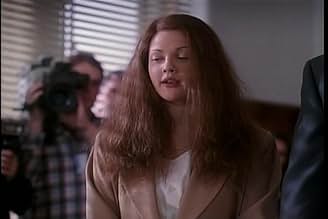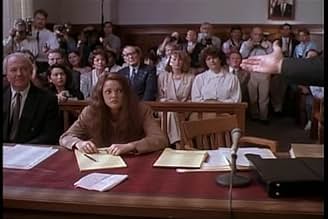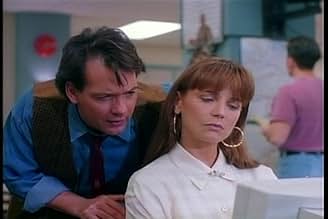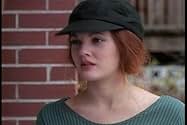NOTE IMDb
5,3/10
1,6 k
MA NOTE
Ajouter une intrigue dans votre langueThe true story of the Long Island teen who shoots and wounds the wife of a man she called her lover.The true story of the Long Island teen who shoots and wounds the wife of a man she called her lover.The true story of the Long Island teen who shoots and wounds the wife of a man she called her lover.
Tony Denison
- Joey Buttafuoco
- (as Anthony John Denison)
Histoire
Le saviez-vous
- AnecdotesDrew Barrymore also played a Lolita the previous year in Fleur de poison (1992).
- GaffesWhen Amy walks to the door, she only presses the doorbell once between the time she gets to the door and the time that Mary Jo Buttafuoco answers the door. When they show it from Mary Jo Buttafuoco's view, the audio reveals the doorbell being rung twice.
- Citations
Mary Jo Buttafuoco: I've been living on baby food since this happened. So you tell her to take a bite for me.
- Versions alternativesExtra sex scenes were added for the video version, using a body double as a substitute for Drew Barrymore.
- ConnexionsFeatured in 101 Biggest Celebrity Oops (2004)
Commentaire à la une
Amy Fisher, aka the "Long Island Lolita", was a seventeen-year-old girl who, in 1992, shot and severely wounded Mary Jo Buttafuoco, the wife of her thirty-something lover Joey Buttafuoco. Fisher was subsequently sentenced to seven years in prison. The media have always been prone to sensationalising crime stories, but this tendency seemed particularly pronounced in America during the early nineties, the age of O. J. Simpson, Lorena Bobbitt and the Menendez brothers. Amy therefore became an instant media celebrity and all three major US television networks rushed out dramatisations of her case. "The Amy Fisher Story" was ABC's contribution; the others were "Amy Fisher: My Story" (NBC) and "Casualties of Love: the Long Island Lolita Story" (CBS).
I cannot compare "The Amy Fisher Story" with "Casualties of Love", which I have never seen, and will not attempt a comparison with the NBC version (known in Britain as "Lethal Lolita") as I have not seen it since was first seen on British television about fifteen years ago. "The Amy Fisher Story" did, however, remind me of another TV movie from the early nineties, "Too Young to Die?" from three years earlier. Both films are, to some extent at least, based on true stories and both deal with a shooting carried out by a teenage girl. Both feature an outstanding performance from an up-and-coming young actress, Juliette Lewis in the earlier film and Drew Barrymore here. During their teenage years both Lewis and Barrymore seemed to specialise in "wild child" roles- Barrymore's best-known was probably in "Poison Ivy"- and in Barrymore's case there was plenty of speculation that these roles mirrored her off-screen antics. Here she is excellent as Amy- a wild, out-of-control young woman, at war with her strict parents (especially her father) and obsessed with her older lover.
Of the two films, "Too Young to Die?", which is several cuts above the average made-for-TV true crime drama, is the better. I think it gains by the decision to fictionalise the story on which it is based. It advertised itself not as the true story of the Attina Cannady case but rather as a fictional story loosely based on that case, which makes it easier for the film to raise some very pertinent questions about an important social issue, namely America's use of the death penalty. The acting is also of a higher standard in that film; apart from Barrymore's few contributions in "The Amy Fisher Story" stand out.
"The Amy Fisher Story" did, by contrast, advertise itself as a dramatisation of a true story, and like many such films, especially made-for-TV ones, is told in a drily factual style. It is not, moreover, even factually accurate in all particulars. After his wife's shooting, Joey Buttafuoco denied that there had ever been any sexual relationship between Amy and himself, claiming that she had grown desperate when he rejected her advances. The film, which was rushed out soon after the shooting, takes these denials at face value, presumably in order not to jeopardise Buttafuoco's pending trial for statutory rape, but soon afterwards he changed his plea to guilty and served several months in jail.
In many respects "The Amy Fisher Story" is no more than an average film, but I have given it an above-average mark for Barrymore's performance. 6/10
I cannot compare "The Amy Fisher Story" with "Casualties of Love", which I have never seen, and will not attempt a comparison with the NBC version (known in Britain as "Lethal Lolita") as I have not seen it since was first seen on British television about fifteen years ago. "The Amy Fisher Story" did, however, remind me of another TV movie from the early nineties, "Too Young to Die?" from three years earlier. Both films are, to some extent at least, based on true stories and both deal with a shooting carried out by a teenage girl. Both feature an outstanding performance from an up-and-coming young actress, Juliette Lewis in the earlier film and Drew Barrymore here. During their teenage years both Lewis and Barrymore seemed to specialise in "wild child" roles- Barrymore's best-known was probably in "Poison Ivy"- and in Barrymore's case there was plenty of speculation that these roles mirrored her off-screen antics. Here she is excellent as Amy- a wild, out-of-control young woman, at war with her strict parents (especially her father) and obsessed with her older lover.
Of the two films, "Too Young to Die?", which is several cuts above the average made-for-TV true crime drama, is the better. I think it gains by the decision to fictionalise the story on which it is based. It advertised itself not as the true story of the Attina Cannady case but rather as a fictional story loosely based on that case, which makes it easier for the film to raise some very pertinent questions about an important social issue, namely America's use of the death penalty. The acting is also of a higher standard in that film; apart from Barrymore's few contributions in "The Amy Fisher Story" stand out.
"The Amy Fisher Story" did, by contrast, advertise itself as a dramatisation of a true story, and like many such films, especially made-for-TV ones, is told in a drily factual style. It is not, moreover, even factually accurate in all particulars. After his wife's shooting, Joey Buttafuoco denied that there had ever been any sexual relationship between Amy and himself, claiming that she had grown desperate when he rejected her advances. The film, which was rushed out soon after the shooting, takes these denials at face value, presumably in order not to jeopardise Buttafuoco's pending trial for statutory rape, but soon afterwards he changed his plea to guilty and served several months in jail.
In many respects "The Amy Fisher Story" is no more than an average film, but I have given it an above-average mark for Barrymore's performance. 6/10
- JamesHitchcock
- 14 janv. 2010
- Permalien
Meilleurs choix
Connectez-vous pour évaluer et suivre la liste de favoris afin de recevoir des recommandations personnalisées
Détails
Contribuer à cette page
Suggérer une modification ou ajouter du contenu manquant

Lacune principale
By what name was The Amy Fisher Story (1993) officially released in Canada in English?
Répondre

